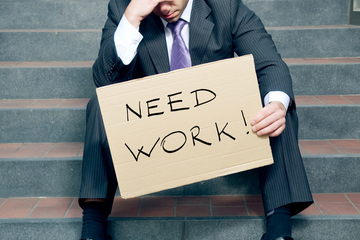
By Adam Marletta
Seven years after Wall Street’s debauched binge of speculator fraud wiped out 40 percent of the world’s wealth, the capitalist press continues to laud the supposed economic recovery.
The Portland Press Herald/Maine Sunday Telegram, in a recent front-page story, proclaims Maine’s unemployment rate has reached its lowest level since 2001, at 4.0 percent (“Jobless rate falloff gives job seekers the upper hand,” 01/27/2016).
This is a problem for employers, staff writer, Edward D. Murphy explains, because now they have to “work harder” to find and keep “good candidates” for jobs. Some companies, like Hannaford, the state’s largest private employer, have been forced to “put up signs to attract job applicants,” rather than just wait for them to walk in and inquire about work.
Other companies fear they may even have to (gasp!) raise wages(!) Say it ain’t so, Eddie!
Laura Thibodeau, owner and president of Portland-based recruiting firm, Springborn Staffing, calls the recent economic upswing a “buyer’s market for the job seeker.” On the prospect of raising wages, Thibodeau says, “It gets to be a ‘pain point'” for employers. Yet a participant at a recent public forum I attended legitimately could not understand why employer-union relationships are “so contentious” in the U.S….
But Portland resident Max Mendez has little sympathy for the beleaguered employers of the world.
“I think I’m getting tired of hearing about how hard it is to find ‘qualified’ candidates for employment,” said Mendez. “These businesses seem to have a secret checklist, and if you don’t hit X of Y buzzwords or data points, you don’t get considered.”
The Press Herald story–which contains quotes from three employers, but none from actual job-seekers or working-class members–is typical of both the paper’s economic coverage and, by extension, the corporate print media in general. For all of the media’s misplaced allegiance to so-called journalistic “objectivity,” Murphy’s story is almost gleefully one-sided.
Even worse, his facts are wrong.
The actual unemployment rate (what economists refer to as the “U-6” measure of unemployment) nationwide is closer to 10 percent. The U-6 rate factors in those the “official” unemployment rate ignores, including part-time workers, temps, and those who have basically given up looking for a job, entirely. That measure is slightly down from 12.6 in late 2014–but not by much.
And unemployment is even worse for black Americans–with the “official” numbers at 9.5 percent as of December 2015, according to The Atlantic.
In other words, we are still not out of the shadow of the Great Recession. (And some economists fear another downturn could be right around the corner.) Meanwhile, wages remain stagnant, rents are through the roof, heroin has infected our communities, and corporations are still hoarding trillions of dollars which, in the asinine logic of “free-market” capitalism, were supposed to have magically “trickled-down” to the rest of us.
What’s the Power Ball up to, now…?
Furthermore, the jobs that have been added since the recession are almost entirely low-wage service and retail jobs, or temporary positions. According to a March 2015 story in the Press Herald, the majority of job growth in the state is primarily confined to fast food restaurants, retail, and personal care work. “The top five jobs Maine employers most needed filled,” the report states, “all paid a median hourly wage of less than $12…”
“This isn’t a recovery,” Dr. Jill Stein, the Green Party’s presidential candidate, told me at a recent campaign stop at the University of New Hampshire. “It’s an emergency.”
Employers justify their pickiness (or is it stinginess…?) as a result of the so-called “skills gap.” But this is nonsense. Working class Americans are already plenty skilled. Indeed, my generation is the most educated in history, and we are seeing record numbers of Baby Boomers returning to college or adding to their skill-set at community colleges.
As Wharton School professor of management, Peter Cappelli, reveals in his book, Why Good People Can’t Get Jobs, the much maligned “skills gap” is little more than a trendy, technocratic buzzword to justify employers’ abysmally low wages. Cappelli, through his surveys of dozens of businesses, found that when pressed most employers concede they cannot find “qualified candidates” for job openings because those candidates will not accept their low wages.
“That’s not a skills shortage,” Cappelli writes, “it’s simply being unwilling to pay the going price.”
Cappelli also blames employers for their unwillingness to train new hires, and their overreliance on absurdly selective resume-scanning computer programs that weed out even the most qualified candidates for the job.
In essence, Cappelli says, employers are “looking for a unicorn.”
Yet, as astute as Cappelli’s criticism of the elite gatekeepers to employment is, I would take his assessment even further. The fact is capitalism does not allow for full-employment. In fact, as Karl Marx and Frederick Engels understood, the system is designed to prevent full-employment. Capitalism can only function so long as there remains a “reserve army of labor,” at any given time so employers can justify their lousy wages and opposition to labor unions.
You don’t want to pick tomatoes for ten cents a barrel…? Fine. There are literally hundreds of people lined up outside who will!
This begs the question: If capitalism cannot provide a job for every citizen capable of working, how can it be credibly justified as an efficient economic system?
It is a question many are asking–particularly young people and debt-saddled college graduates who have been most hurt by the Great Recession. Little wonder then, that a 2011 Pew Research poll finds a majority of Americans 18-29 years-old have a more favorable view of socialism than capitalism. Close to 47 percent, the same poll found, have a negative view of capitalism.
So, no–I do not believe the hype when it comes to the capitalist press’s rosy economic outlook. And neither should you.
“Our leaders know we are turning into a giant ghetto,” journalist Matt Taibbi writes in his 2010 book, Griftopia, “and they are taking every last hubcap they can get their hands on before the rest of us wake up and realize what’s happened.”






It’s (Still) the Economy, Stupid
By Adam Marletta
Seven years after Wall Street’s debauched binge of speculator fraud wiped out 40 percent of the world’s wealth, the capitalist press continues to laud the supposed economic recovery.
The Portland Press Herald/Maine Sunday Telegram, in a recent front-page story, proclaims Maine’s unemployment rate has reached its lowest level since 2001, at 4.0 percent (“Jobless rate falloff gives job seekers the upper hand,” 01/27/2016).
This is a problem for employers, staff writer, Edward D. Murphy explains, because now they have to “work harder” to find and keep “good candidates” for jobs. Some companies, like Hannaford, the state’s largest private employer, have been forced to “put up signs to attract job applicants,” rather than just wait for them to walk in and inquire about work.
Other companies fear they may even have to (gasp!) raise wages(!) Say it ain’t so, Eddie!
Laura Thibodeau, owner and president of Portland-based recruiting firm, Springborn Staffing, calls the recent economic upswing a “buyer’s market for the job seeker.” On the prospect of raising wages, Thibodeau says, “It gets to be a ‘pain point'” for employers. Yet a participant at a recent public forum I attended legitimately could not understand why employer-union relationships are “so contentious” in the U.S….
But Portland resident Max Mendez has little sympathy for the beleaguered employers of the world.
“I think I’m getting tired of hearing about how hard it is to find ‘qualified’ candidates for employment,” said Mendez. “These businesses seem to have a secret checklist, and if you don’t hit X of Y buzzwords or data points, you don’t get considered.”
The Press Herald story–which contains quotes from three employers, but none from actual job-seekers or working-class members–is typical of both the paper’s economic coverage and, by extension, the corporate print media in general. For all of the media’s misplaced allegiance to so-called journalistic “objectivity,” Murphy’s story is almost gleefully one-sided.
Even worse, his facts are wrong.
The actual unemployment rate (what economists refer to as the “U-6” measure of unemployment) nationwide is closer to 10 percent. The U-6 rate factors in those the “official” unemployment rate ignores, including part-time workers, temps, and those who have basically given up looking for a job, entirely. That measure is slightly down from 12.6 in late 2014–but not by much.
And unemployment is even worse for black Americans–with the “official” numbers at 9.5 percent as of December 2015, according to The Atlantic.
In other words, we are still not out of the shadow of the Great Recession. (And some economists fear another downturn could be right around the corner.) Meanwhile, wages remain stagnant, rents are through the roof, heroin has infected our communities, and corporations are still hoarding trillions of dollars which, in the asinine logic of “free-market” capitalism, were supposed to have magically “trickled-down” to the rest of us.
What’s the Power Ball up to, now…?
Furthermore, the jobs that have been added since the recession are almost entirely low-wage service and retail jobs, or temporary positions. According to a March 2015 story in the Press Herald, the majority of job growth in the state is primarily confined to fast food restaurants, retail, and personal care work. “The top five jobs Maine employers most needed filled,” the report states, “all paid a median hourly wage of less than $12…”
“This isn’t a recovery,” Dr. Jill Stein, the Green Party’s presidential candidate, told me at a recent campaign stop at the University of New Hampshire. “It’s an emergency.”
Employers justify their pickiness (or is it stinginess…?) as a result of the so-called “skills gap.” But this is nonsense. Working class Americans are already plenty skilled. Indeed, my generation is the most educated in history, and we are seeing record numbers of Baby Boomers returning to college or adding to their skill-set at community colleges.
As Wharton School professor of management, Peter Cappelli, reveals in his book, Why Good People Can’t Get Jobs, the much maligned “skills gap” is little more than a trendy, technocratic buzzword to justify employers’ abysmally low wages. Cappelli, through his surveys of dozens of businesses, found that when pressed most employers concede they cannot find “qualified candidates” for job openings because those candidates will not accept their low wages.
“That’s not a skills shortage,” Cappelli writes, “it’s simply being unwilling to pay the going price.”
Cappelli also blames employers for their unwillingness to train new hires, and their overreliance on absurdly selective resume-scanning computer programs that weed out even the most qualified candidates for the job.
In essence, Cappelli says, employers are “looking for a unicorn.”
Yet, as astute as Cappelli’s criticism of the elite gatekeepers to employment is, I would take his assessment even further. The fact is capitalism does not allow for full-employment. In fact, as Karl Marx and Frederick Engels understood, the system is designed to prevent full-employment. Capitalism can only function so long as there remains a “reserve army of labor,” at any given time so employers can justify their lousy wages and opposition to labor unions.
You don’t want to pick tomatoes for ten cents a barrel…? Fine. There are literally hundreds of people lined up outside who will!
This begs the question: If capitalism cannot provide a job for every citizen capable of working, how can it be credibly justified as an efficient economic system?
It is a question many are asking–particularly young people and debt-saddled college graduates who have been most hurt by the Great Recession. Little wonder then, that a 2011 Pew Research poll finds a majority of Americans 18-29 years-old have a more favorable view of socialism than capitalism. Close to 47 percent, the same poll found, have a negative view of capitalism.
So, no–I do not believe the hype when it comes to the capitalist press’s rosy economic outlook. And neither should you.
“Our leaders know we are turning into a giant ghetto,” journalist Matt Taibbi writes in his 2010 book, Griftopia, “and they are taking every last hubcap they can get their hands on before the rest of us wake up and realize what’s happened.”